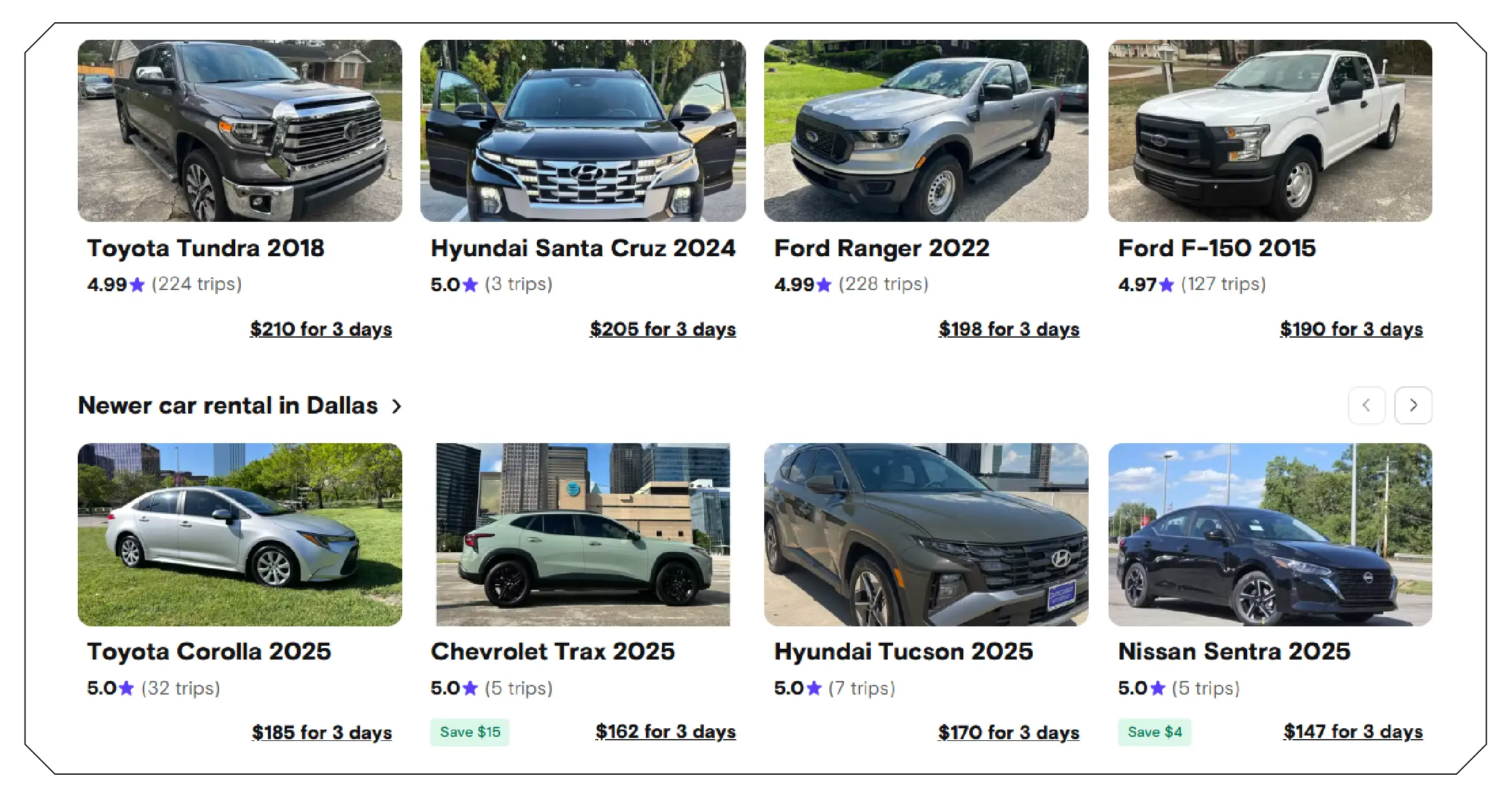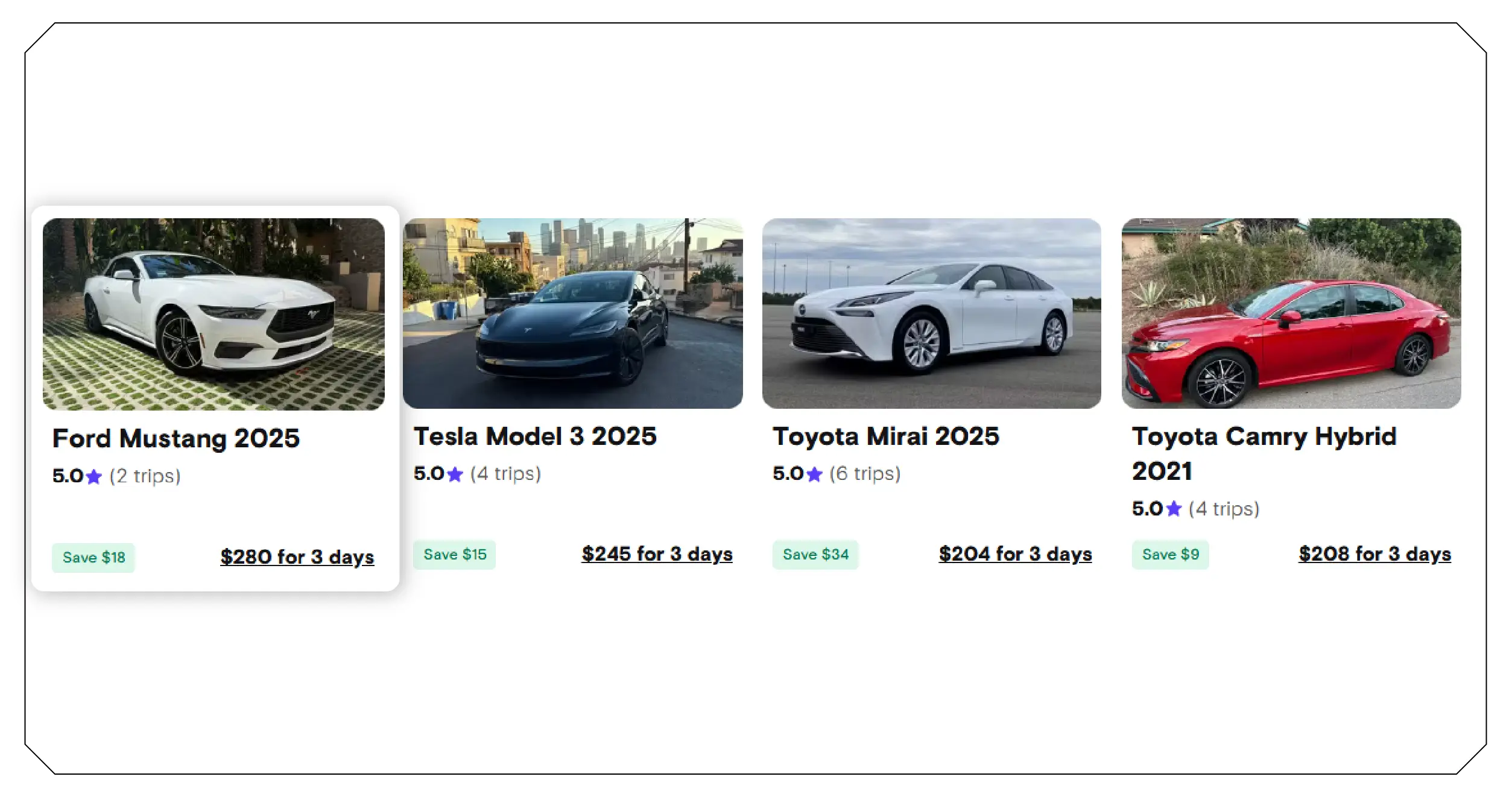How Does Car Rental Data Scraping for Turo in USA Transform Market Research?

Introduction
In recent years, the car rental industry has undergone a digital transformation driven by advanced analytics, consumer behavior tracking, and online platforms like Turo. This peer-to-peer car-sharing marketplace has become one of the most innovative disruptors in the U.S. mobility sector. Businesses, data analysts, and market researchers now rely heavily on car rental data scraping for Turo in USA to collect, analyze, and interpret dynamic pricing models, availability trends, and user preferences across different states and cities.
Through Car Rental Data Scraping Services, organizations gain access to actionable datasets that help them identify shifts in rental demand, pricing structures, fleet composition, and seasonal booking variations. This data-driven approach enables automotive businesses, tourism agencies, and mobility startups to remain competitive in a rapidly evolving market.
When companies engage in Scraping Turo USA Data for Market Analysis, they unlock comprehensive insights into location-based car listings, daily rental fluctuations, host ratings, vehicle models, and promotional patterns. With advanced scraping tools, stakeholders can make better-informed strategic decisions related to pricing strategies, fleet expansion, and customer engagement.
Understanding Turo’s Role in the U.S. Car Rental Ecosystem

Turo operates as a peer-to-peer car rental platform where individual car owners list their vehicles for rent, creating a shared economy model that challenges traditional car rental agencies like Hertz and Enterprise. This decentralized system allows customers to rent vehicles based on convenience, price, and unique vehicle types—from economy sedans to luxury SUVs.
However, due to Turo’s dynamic pricing and availability model, the platform’s data is constantly changing. Tracking this information manually is nearly impossible. This is where automated scraping solutions become essential. By collecting structured data from thousands of listings, analysts can detect micro-trends that would otherwise go unnoticed.
For example:
- Identifying the most rented car models in New York or Los Angeles.
- Analyzing how weekend pricing compares to weekday rates.
- Tracking new hosts and regions with rising rental activity.
- Measuring the impact of holidays and local events on rental demand.
The Importance of Data in the Car Rental Industry
In today’s competitive market, car rental companies cannot rely on guesswork. Data is at the core of operational and strategic success. It provides transparency into consumer preferences, competitive pricing, and performance metrics. With the growing prominence of shared mobility, traditional car rental companies are leveraging scraping tools to analyze competitors like Turo.
Data scraping provides:
- Dynamic Pricing Insights: Helps identify fluctuations in daily rental rates.
- Demand Prediction: Uses historical data to forecast peak rental periods.
- Customer Segmentation: Classifies users based on rental frequency, duration, and vehicle choice.
- Geographic Insights: Reveals which regions experience the highest rental activity.
Incorporating these insights helps companies optimize pricing models, plan vehicle inventory, and tailor marketing campaigns for maximum ROI.
Building a Car Rental Price Trends Dataset
A Car Rental Price Trends Dataset serves as the foundation for analyzing market patterns. Such datasets typically contain attributes like vehicle type, location, daily rental rate, mileage limit, and host reviews. Over time, this data helps reveal trends that can influence strategic decision-making.
Example attributes within this dataset may include:
- City or Zip Code
- Vehicle Make and Model
- Rental Duration (hourly, daily, weekly)
- Price per Day
- Host Rating and Experience Level
- Vehicle Availability by Date
Businesses use these datasets to benchmark Turo’s rates against competitors or track how external factors—such as gas prices, inflation, or tourism demand—affect pricing.
Real-time Monitoring and Market Responsiveness
To stay competitive, companies must track changes as they happen. Through Real-time Turo rental price monitoring in USA, it becomes possible to detect daily price shifts and understand how hosts respond to demand spikes.
Real-time data monitoring offers several benefits:
- Dynamic Adjustments: Businesses can instantly compare their own pricing to the market average.
- Seasonal Optimization: Detects early signs of peak demand periods like summer or holidays.
- Promotional Tracking: Observes how discounts and offers influence booking volumes.
- Fleet Utilization: Helps identify underperforming vehicle categories.
- Competitor Benchmarking: Provides side-by-side comparisons of Turo’s listings with traditional rental platforms.
With these insights, car rental firms and investors can act promptly—adjusting marketing, inventory, and promotions based on the real-time rental environment.
Why Turo Car Rental Data Scraping is Essential?

Turo Car Rental Data Scraping allows data collection at scale from the platform, providing access to vital market variables like pricing, availability, reviews, and promotions. Using automated scraping solutions, businesses can aggregate thousands of data points without manual intervention.
Benefits of Turo data scraping include:
- Comprehensive Market Visibility: Collects pricing data across multiple U.S. cities.
- Consumer Behavior Analysis: Identifies how customers choose between vehicles.
- Demand Forecasting: Predicts which vehicle types are likely to perform better in certain regions.
- Competitive Strategy Development: Monitors other hosts’ strategies to find areas of opportunity.
- Data-Driven Decision-Making: Enhances internal analytics systems with accurate, fresh data.
For businesses operating in the car-sharing or rental domain, Turo’s data is a goldmine for innovation and competitive benchmarking.
Tracking Promotions and Discounts Across Turo
Monitoring Turo’s promotional trends offers unique advantages. Many hosts and regional operators offer discounts during off-peak seasons or promotional periods. Scrape Turo rental promotions and discount tracking USA to help companies collect this information systematically and analyze how discounts impact booking rates.
This can be useful for:
- Evaluating the Effectiveness of Promotions: Comparing promotional listings versus standard-priced ones.
- Seasonal Discount Strategy: Determining which months have the most active discount offers.
- Host Behavior Analysis: Understanding how hosts use discounts to drive engagement.
- Consumer Response Mapping: Identifying how price drops affect booking frequency.
Tracking these promotions helps design more responsive pricing strategies and understand customer sensitivity to offers.
Extracting Availability and Deals for Strategic Insights
Data-driven organizations often need to Extract Turo rental availability and deals in the USA to understand regional supply-demand gaps. Availability data indicates how often certain vehicles are booked or remain idle, which can highlight growth opportunities.
For example:
- A consistent shortage of SUVs in mountain regions may signal expansion potential.
- High availability but low booking rates in urban centers might reveal pricing issues.
- Time-based availability trends can inform better scheduling and fleet management.
This extraction process helps investors, rental agencies, and tourism companies fine-tune strategies that align with real-world market dynamics.
Analyzing Car Rental Prices Through Turo Datasets
The Turo Car Rental Prices Dataset provides invaluable insights into how pricing fluctuates based on multiple factors, including season, geography, and vehicle class. Analysts use these datasets to visualize trends and predict future pricing behavior.
Some factors influencing prices include:
- Vehicle Popularity: Cars with high demand often command premium rates.
- Host Reputation: Verified and top-rated hosts can charge more per rental.
- Geographic Demand: Tourist-heavy cities typically show higher price averages.
- Booking Duration: Long-term rentals often come with discounts or special rates.
- Fuel Efficiency and Model Year: Newer, fuel-efficient cars are often priced higher.
By analyzing historical data, companies can identify long-term patterns that lead to better forecasting and pricing optimization.
How Car Rental Data Scraping Supports Competitive Analysis?
Car rental scraping empowers businesses with data-driven competitive analysis. Companies can identify:
- Top-performing regions where Turo sees high booking volumes.
- Emerging vehicle categories (e.g., electric vehicles) gaining popularity.
- New pricing strategies employed by hosts.
- Consumer preferences based on car features and rental durations.
Armed with this intelligence, organizations can innovate faster, enter new markets with confidence, and align services with evolving consumer demands.
Ethical and Legal Considerations in Turo Data Scraping
While data scraping offers immense benefits, ethical and compliant data extraction is crucial. Businesses must adhere to Turo’s terms of service and data privacy regulations.
Best practices include:
- Using publicly available data only.
- Avoiding overloading the platform with excessive scraping requests.
- Respecting personal user data and not collecting identifiable information.
- Employing compliant scraping APIs and anonymization techniques.
When done responsibly, scraping provides value to the ecosystem without breaching platform integrity.
Technologies Used in Turo Data Scraping
Modern data scraping involves a combination of tools and techniques to ensure efficiency and reliability. These include:
- Python-based Frameworks (e.g., Scrapy, BeautifulSoup): Used for structured data collection.
- Headless Browsers (e.g., Selenium, Puppeteer): For dynamic content rendering.
- Proxy Rotations and Captcha Solvers: To prevent IP bans and maintain smooth scraping.
- Data Cleaning Pipelines: For removing duplicates, formatting inconsistencies, and irrelevant data.
- APIs and Cloud-based Storage: For seamless data delivery to analytics dashboards.
This technological stack ensures high-quality, accurate, and scalable data collection for long-term business applications.
Use Cases of Turo Data Scraping Across Industries
- Automotive Leasing Companies: To benchmark pricing and introduce competitive rental packages.
- Travel and Tourism Agencies: To recommend the most cost-effective car rental options.
- Data Analytics Firms: For market intelligence and forecasting.
- Insurance Companies: To analyze regional vehicle utilization trends.
- Investors and Startups: To identify market gaps for launching new mobility ventures.
These use cases highlight how Turo data scraping transcends industry boundaries, offering utility across various sectors.
Visualizing Insights from Turo Data
With advanced analytics, scraped data can be transformed into powerful visualizations:
- Heatmaps: Showing high-demand cities for car rentals.
- Trend Charts: Highlighting price fluctuations over time.
- Pie Charts: Displaying vehicle type distribution (SUVs, sedans, convertibles).
- Bar Graphs: Comparing regional rental averages.
Such visual insights empower stakeholders to communicate findings effectively and guide decision-making processes.
Future of Data-Driven Car Rental Marketplaces

The car rental industry is evolving toward predictive intelligence. In the coming years, we’ll see integration with AI-based forecasting, demand elasticity models, and automated dynamic pricing algorithms. Scraping tools will continue to be the backbone of this evolution, feeding real-time data into machine learning systems.
The future will also bring:
- AI-powered rental recommendations.
- Integration with smart mobility apps.
- Blockchain-based rental tracking systems.
- Personalized pricing engines.
For companies that embrace these technologies, staying ahead of the competition will become significantly easier.
How Travel Scrape Can Help You?
- Comprehensive Data Extraction Solutions: We offer advanced web scraping tools to collect detailed car rental data, including vehicle models, daily rates, host ratings, locations, and availability from platforms like Turo, Hertz, and Enterprise — all structured into clean, analyzable datasets.
- Real-Time Price and Availability Monitoring: Our systems enable continuous tracking of car rental prices, discounts, and promotional offers in real time, helping businesses react quickly to market changes and optimize pricing strategies dynamically.
- Customized Data Dashboards and APIs: We deliver scraped car rental data via user-friendly dashboards or APIs, allowing clients to integrate live data streams directly into their internal systems or analytics tools for instant insights.
- Market and Competitor Intelligence: By aggregating and analyzing multi-platform rental data, we provide actionable intelligence on competitor pricing, fleet composition, and regional demand trends — supporting data-driven decision-making.
- Compliance and Data Quality Assurance: Our scraping processes strictly follow legal and ethical standards, ensuring compliance with data privacy regulations. We also apply cleaning and validation techniques to maintain the highest data accuracy and consistency.
Conclusion
The growing significance of Turo in the U.S. car rental landscape makes data scraping an essential business practice. From pricing intelligence to consumer behavior analysis, scraping unlocks immense value for businesses aiming to thrive in this digital economy. With Web Scraping Turo rental pricing trends in USA, companies can monitor changing market dynamics in real time, enabling adaptive pricing strategies and informed decision-making.
Through method to Scrape USA Turo Rental Deals via API, data scientists and analysts can automate data collection pipelines and transform raw data into actionable insights that drive growth and efficiency.
Ultimately, integrating Car Rental Data Intelligence into your business strategy empowers stakeholders to make smarter, faster, and more data-driven decisions—fueling innovation in one of the fastest-evolving sectors of modern mobility.
Ready to elevate your travel business with cutting-edge data insights? Scrape Aggregated Flight Fares to identify competitive rates and optimize your revenue strategies efficiently. Discover emerging opportunities with tools to Extract Travel Website Data, leveraging comprehensive data to forecast market shifts and enhance your service offerings. Real-Time Travel App Data Scraping Services helps stay ahead of competitors, gaining instant insights into bookings, promotions, and customer behavior across multiple platforms. Get in touch with Travel Scrape today to explore how our end-to-end data solutions can uncover new revenue streams, enhance your offerings, and strengthen your competitive edge in the travel market.